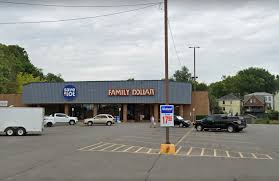Family Dollar Closing List 2024: An Analysis of Store Closures and What it Means for Consumers

for affordable household goods, food, health and beauty products, and more. However, as we move into 2024, the retailer faces significant changes, including a growing list of store closures. This article will explore the reasons behind these closures, the stores affected, and what this means for the future of Family Dollar and its customers.
Table of Contents
ToggleThe History and Evolution of Family Dollar
Family Dollar was founded in 1959 by Leon Levine in Charlotte, North Carolina. The chain was built on a simple yet powerful idea: providing essential goods at affordable prices. Over the decades, it grew to become one of the largest discount retailers in the U.S., with thousands of stores spread across the country.
In 2015, Family Dollar was acquired by Dollar Tree, a move that promised to enhance the brand’s presence and scale. Despite this merger, Family Dollar maintained its brand identity and continued to operate as a separate entity within the Dollar Tree family of stores.
At its peak, Family Dollar operated more than 8,000 stores, and its low-cost products appealed to a wide range of customers, especially in rural and economically challenged areas. But in recent years, the company has faced significant challenges that have led to the closure of many of its locations.
The Reasons Behind Family Dollar’s Store Closures
Several factors have contributed to Family Dollar’s decision to close stores in 2024. These closures are a direct result of both internal and external pressures on the company. Here are some of the key reasons:
1. Financial Struggles and Declining Sales
Family Dollar has been facing financial difficulties in recent years. Despite its low-price strategy, which typically performs well in economic downturns, the chain has struggled to maintain sales growth. Poor performance in certain regions, a failure to modernize certain stores, and challenges in adapting to e-commerce trends have all played a part in these financial troubles.
In 2020, Family Dollar’s same-store sales saw a slight decline, and while the company has made efforts to improve its offerings, it has struggled to compete with larger retailers like Walmart and Amazon. The rise of online shopping, where consumers can access even deeper discounts without leaving home, has proven to be a particularly significant challenge.
2. Increased Competition from Other Discount Retailers
Family Dollar is not the only player in the discount retail space. Competitors like Dollar General, Walmart, and even Aldi have ramped up their efforts to capture the same price-conscious consumer. Dollar General, for instance, has been expanding rapidly and now operates more than 18,000 stores across the U.S. Walmart and Aldi have also made moves to corner the discount sector by offering competitive pricing and a wider selection of goods.
This intense competition has forced Family Dollar to re-evaluate its position in the marketplace. As a result, it has become increasingly difficult for the company to maintain its footing in areas where it has not been able to differentiate itself from its competitors.
3. Operational Inefficiencies and Supply Chain Challenges
Family Dollar has been criticized for operational inefficiencies, including a supply chain that is often described as unreliable. Over the years, the company has faced difficulties in ensuring that products are consistently available on store shelves. This issue became particularly problematic during the COVID-19 pandemic when supply chain disruptions were widespread.
Many Family Dollar stores also require significant investments in infrastructure and maintenance, which the company has struggled to provide in some regions. As part of its strategy to turn things around, Family Dollar has closed underperforming stores in order to concentrate resources on more profitable locations.
4. Management Shakeups
Family Dollar has also experienced management changes that have influenced its direction. In recent years, leadership at the company has shifted, with a focus on revamping operations and attempting to reposition the brand in a changing retail landscape. However, these changes have not always led to the desired results, and the company has faced criticism for its lack of a coherent strategy in some instances.
The loss of experienced managers and a shifting focus away from traditional brick-and-mortar retail has contributed to Family Dollar’s struggles, as decisions on store closures have sometimes seemed reactive rather than part of a well-thought-out long-term plan.
5. Real Estate and Lease Issues
Another factor affecting Family Dollar’s closures is real estate and leasing challenges. Many of Family Dollar’s stores are located in leased buildings, and with fluctuating rent costs and real estate prices, it can be difficult to maintain profitable locations. In areas where lease agreements are no longer financially viable, Family Dollar has opted to close stores rather than continue incurring losses.
Additionally, some of Family Dollar’s stores are located in areas that are no longer as populous or economically viable as they once were. With a growing trend of urbanization and the shifting retail landscape, some stores in rural or declining urban areas have seen reduced foot traffic, prompting closures.
The Impact of the Closures
The decision to close Family Dollar stores has significant implications for both consumers and employees. Let’s take a closer look at these impacts.
Impact on Consumers
For customers who rely on Family Dollar for low-cost essentials, the closures could be an inconvenience. In rural or underserved areas, Family Dollar may be one of the few options for affordable products, and the loss of a nearby location could mean longer travel times or the need to switch to other retailers.
In addition, if the store closures are part of a broader strategy to scale down the company’s operations, customers may see a decrease in the variety of products offered. Family Dollar has already faced criticism in recent years for having limited selections compared to its competitors, and the closures could lead to even fewer options in certain locations.
However, some customers may benefit from these closures if the company decides to streamline its operations and focus on higher-performing stores, which could lead to better service and availability of products at those locations.
Impact on Employees
Store closures often lead to layoffs and job insecurity. Family Dollar employs thousands of people across its network of stores, and closures will affect both store-level workers and higher-level staff. Employees at the affected locations may be reassigned to other stores, but in many cases, positions are being eliminated entirely.
For those who lose their jobs, the closures could exacerbate the challenges of finding new employment, especially in regions where job opportunities are already limited. Given that many Family Dollar locations are in smaller towns or economically disadvantaged areas, the closures may disproportionately impact workers who depend on these jobs for their livelihoods.
Family Dollar’s Plans for the Future
Despite these challenges, Family Dollar is not entirely abandoning its retail operations. The company’s parent, Dollar Tree, has indicated that it will continue to invest in the Family Dollar brand, but with a more focused approach. As part of the restructuring, Family Dollar will likely prioritize more profitable and strategically located stores, while continuing to experiment with new formats and offerings that could resonate with changing consumer preferences.
Dollar Tree has also indicated that it will explore the expansion of its Family Dollar stores into certain urban markets where demand for discount products is high. This shift could help the brand regain some of its lost market share by tapping into a new demographic.
Furthermore, there is potential for Family Dollar to further integrate with Dollar Tree to improve supply chain management and operational efficiency. This could help the chain reduce its operational costs, improve product availability, and streamline its in-store experiences.
Family Dollar Closing List 2024
While the exact list of closures for 2024 is still evolving, reports have emerged indicating that Family Dollar will be closing dozens of stores across the country. Some of these closures are part of a broader initiative to shut down underperforming locations, particularly in rural or less populated areas.
Conclusion
Family Dollar’s store closures in 2024 reflect the broader challenges faced by discount retailers in a rapidly changing retail landscape. With increased competition, changing consumer habits, and financial struggles, the company has had to make tough decisions to remain viable. While the closures will undoubtedly have an impact on consumers and employees, the company’s ongoing efforts to streamline operations and adapt to the future of retail may help it regain its footing.





